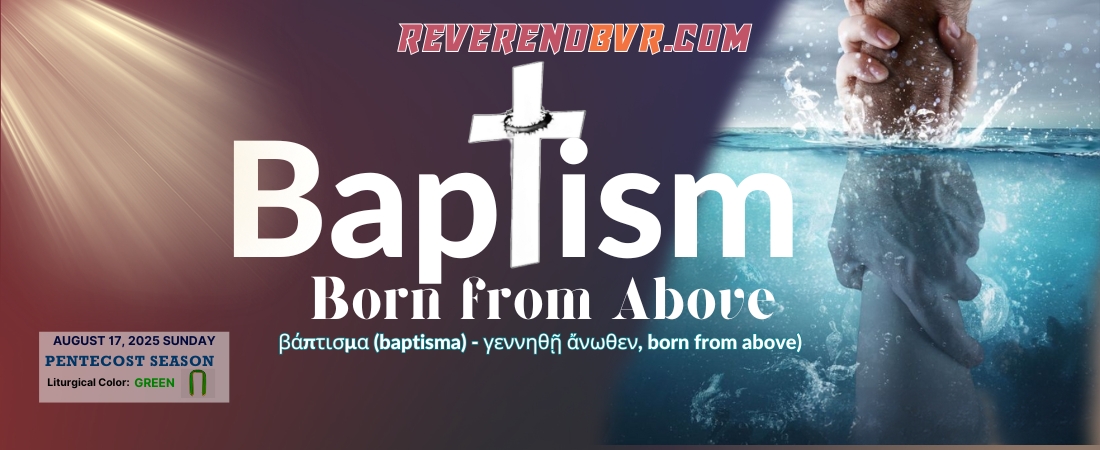Baptism is the divine mystery of being “born from above”—a spiritual rebirth through water and the Spirit that marks the believer’s passage from death to new life in Christ. Rooted in biblical imagery from Noah’s flood to Nicodemus’ encounter with Jesus, baptism initiates us into a transformative journey of identity, mission, and faithful discipleship in the Body of Christ.
Sermon Title: Baptism: Born from Above – A New Life in the Spirit through Water and Word
Date: Sunday, August 17th 2025.
Textual References: Genesis 8:1–14; John 3:1–8; Colossians 3:1–11; Psalm 25
Original Language Reflections (For deeper study, see Section 9 in the sermon): Refer Table explaining Hebrew & Greek Words.
Introduction: A New Beginning from the Waters
Water is a primal symbol in Scripture: it both destroys and delivers. From the watery chaos (תְּהוֹם – tehom) of Genesis to the flood that purified the world, and from the Red Sea that liberated Israel to the Jordan River that inaugurated Christ’s ministry, water signals divine transformation. Baptism (βάπτισμα – baptisma), as practiced in the Church of South India (CSI), is not merely a rite of passage but a sacrament. The Church of South India (C.S.I.), like most mainline traditions, upholds two sacraments: Baptism (βάπτισμα – baptisma) and Holy Communion, each a visible sign of invisible grace (Article XXV, The Book of Common Prayer). In Baptism (βάπτισμα – baptisma), the believer is “born from above” (John 3:3, γεννηθῇ ἄνωθεν – anōthen), entering into union with Christ, dying to sin, and rising to new life.
1. The Waters Recede: Baptism as New Creation (Genesis 8:1–14)
The narrative of Noah in Genesis 8 is more than an ancient flood story. It is a theological archetype. The flood cleanses a world filled with violence (Genesis 6:11), while the ark (תֵּבָה – tevah)—built by faith—is a vessel of salvation. The dove returning with an olive leaf – זַיִת – zayit (8:11) is profoundly symbolic: peace, reconciliation, and a promise of restoration. The early Church Fathers saw in this image a typology of the Holy Spirit (רוּחַ – ruach, πνεῦμα – pneuma) descending at Christ’s baptism (Matthew 3:16), initiating a new creation.
The Apostle Peter later interprets the flood typologically, writing: “In it [the ark] only a few people… were saved through water, and this water symbolizes baptism (βάπτισμα – baptisma)” (1 Peter 3:20–21). Baptism (βάπτισμα – baptisma), then, is not simply a removal of dirt but a pledge to God from a good conscience (συνείδησις – syneidēsis). In this way, we understand baptism (βάπτισμα – baptisma) not merely as ritual cleansing, but as cosmic recreation—a dying and rising akin to Noah stepping onto dry land into a reborn world.
2. Born from Above: The Necessity of Spiritual Regeneration (John 3:1–8)
When Nicodemus approaches Jesus under the cover of night, he represents the sincere seeker in every age: religious, respected, yet still searching.
Jesus’ reply is radical: “Unless one is born from above (γεννηθῇ ἄνωθεν – anōthen), he cannot see the kingdom of God” (v.3). The Greek word ἄνωθεν (anōthen) holds a double meaning: “again” and “from above,” capturing both the rebirth and its divine source.
Jesus clarifies in verse 5: “Unless one is born of water and the Spirit (πνεῦμα – pneuma), he cannot enter the kingdom of God.” This dual birth—through water (baptism – βάπτισμα – baptisma) and Spirit (πνεῦμα – pneuma)—is central to Christian initiation. Importantly, the Spirit’s (πνεῦμα – pneuma) action is sovereign and mysterious: “The wind blows wherever it pleases…” (v.8). Like the dove over the waters in Genesis, the Spirit (πνεῦμα – pneuma) hovers and transforms.
Historically, this passage became foundational in patristic and Reformation theologies of baptism (βάπτισμα – baptisma). Augustine emphasized the necessity of regeneration in the sacrament, while Calvin stressed that baptism (βάπτισμα – baptisma) confirms the believer’s entry into covenant, marking the elect as children of God (cf. Institutes IV.xv).
3. Baptismal Living: Death to Sin, Life in Christ (Colossians 3:1–11)
Paul in Colossians speaks to baptized believers (βαπτίζω – baptizō): “Since you have been raised with Christ…” (3:1), echoing baptismal union with Jesus in death and resurrection (cf. Romans 6:3–5). To be baptized (βαπτίζω – baptizō) is to undergo an ontological transformation—a putting to death of the old self (3:5) and a putting on of the new (νέος – neos, 3:10). This is not metaphorical piety but metaphysical reality. Baptism (βάπτισμα – baptisma) rewires identity: “Christ is all, and is in all” (v.11).
This radical reordering of life demands ethical transformation: the baptized (βαπτίζω – baptizō) are called to forsake lust, greed, anger, and deceit. As Basil of Caesarea taught, “baptism (βάπτισμα – baptisma) is the funeral of sin.” Yet more than death, it is also the germination of holiness—the image of God being renewed.
4. The Disposition of the Baptized Heart (Psalm 25)
Psalm 25 is an acrostic poem that reveals the heart of one who trusts God amidst struggle. Its inclusion here reminds us that baptism (βάπτισμα – baptisma), while objective in grace, demands subjective surrender. “Teach (לִמֵּד – limmed) me your paths… guide (נָחָה – nachah) me in your truth” (vv.4–5) is the prayer of every newly baptized Christian. Verse 14 declares: “The Lord confides in those who fear (יָרֵא – yare’) him,” suggesting intimacy with God is reserved for those whose hearts are teachable and humble.
This psalm is therefore a liturgical and ethical mirror: it aligns with baptismal vows to renounce evil and follow Christ, not just intellectually but relationally. The baptized must continually return to this posture of trust (בָּטַח – batach) and transformation.
5.Theological Reflection: Sacrament, Identity, and Mission
The Church of South India i.e., CSI upholds two sacraments: Baptism and the Eucharist. In Baptism, a person is sacramentally initiated into the Body of Christ, sealed with the Holy Spirit, and committed to a lifelong journey of discipleship. This is not merely personal but profoundly ecclesial: Baptism is not about privatized spirituality but entrance into the community of the faithful.
At its core, baptism is about identity—the truest identity of a human person is not nationality, ethnicity, or gender, but baptismal belonging: “you have put on the new self” (Col. 3:10). It is also about mission: as the waters of the flood receded to reveal a renewed earth, so the baptized go forth to be agents of renewal in a broken world. This calling is crucial in a time of identity confusion, ecological crisis, and spiritual hunger.
6. Contemporary Implications
In a world marked by fragmentation, confusion, and despair, Baptism proclaims a different story: You are not an accident. You are not your sin. You are not your past. You are reborn in Christ. This rebirth is not magic, but mystery. It requires the ongoing work of the Spirit and your willing cooperation.
Young people facing academic pressure, professionals facing moral dilemmas, and elders facing loneliness—remember: your baptism is a sign that God has claimed you. When doubts come, say with the psalmist: “In you, O Lord, I put my trust.”
7. Conclusion: Born to Live Differently
Baptism is not the end but the beginning. It is not a graduation but a Genesis. From Noah to Nicodemus, from the flood to the Spirit, Scripture teaches that salvation begins when God reclaims us from the waters of chaos and births us anew. Born from above, we live below as citizens of the Kingdom, pilgrims on the path of holiness.
8. Closing Prayer
Gracious and Eternal Father, We thank You for the gift of Baptism—for calling us from the waters of judgment into the waters of life. Like Noah, we trust Your promise; like Nicodemus, we seek Your truth; like Paul, we die daily to live in You. Pour out Your Holy Spirit upon us once more. Renew in us the joy of our salvation. Make us mindful of our baptismal identity and strengthen us to walk in newness of life. Teach us to set our hearts on things above, to put off all that is earthly, and to live as those who are born from above. In the name of the Father, and of the Son, and of the Holy Spirit, Amen.
9.Learn Words from the Original Scriptures (For deeper understanding and meditation on today’s theme)
| S.No | Term | Language | Original Word – Transliteration (Click on the Word to view its lexical details) | Meaning |
| 1 | Baptism | Greek | βάπτισμα – baptisma | Immersion, washing, a rite of purification |
| 2 | To Baptize | Greek | βαπτίζω – baptizō | To immerse, dip, submerge |
| 3 | Born from above | Greek | ἄνωθεν – anōthen | Born anew/from above |
| 4 | Spirit | Greek/Hebrew | πνεῦμα – pneuma (G4151) / רוּחַ – ruach (H7307) | Spirit, breath, wind (Holy Spirit) |
| 5 | New self | Greek | νέος – neos | The new person/self |
| 6 | Chaos (Deep, Abyss) | Hebrew | תְּהוֹם – tehom | Deep, abyss, watery chaos |
| 7 | Ark | Hebrew | תֵּבָה – tevah | Ark (Noah’s Ark, basket of Moses) |
| 8 | Olive Leaf | Hebrew | זַיִת – zayit | Leaf of an olive tree |
| 9 | Conscience | Greek | συνείδησις – syneidēsis | Moral consciousness, awareness of right and wrong |
| 10 | Trust | Hebrew | בָּטַח – batach | To trust, be confident in |
| 11 | Teach/Guide | Hebrew | לִמֵּד – limmed / נָחָה – nachah | To teach / to lead, guide |
| 12 | Fear (of God) | Hebrew | יָרֵא – yare’ | To fear, revere, be in awe of |
10. Bibliography
- Augustine. Confessions and On Baptism, Against the Donatists.
- Basil of Caesarea. On the Holy Spirit.
- Calvin, John. Institutes of the Christian Religion, Book IV.
- The Book of Common Prayer. Church of South India Edition.
- Dunn, James D.G. The Theology of Paul the Apostle.
- Wright, N.T. Paul and the Faithfulness of God.
- Barth, Karl. Church Dogmatics IV/4: Baptism as the Foundation of the Christian Life.
- Torrance, Thomas F. Theology in Reconstruction.
- Lathrop, Gordon. Holy Things: A Liturgical Theology.
- Ferguson, Everett. Baptism in the Early Church: History, Theology, and Liturgy.
- Moltmann, Jürgen. The Spirit of Life: A Universal Affirmation.
© 2025 ReverendBVR.com | High-Academic Sermon Series, 2025.
Content licensed under Creative Commons Attribution-NonCommercial-NoDerivatives 4.0 International (CC BY-NC-ND 4.0). You are free to share — copy and redistribute the material in any medium or format with proper attribution. No commercial use or modifications allowed without explicit permission.
For further sermons and biblical reflections, please visit 🌐 www.reverendbvr.com/sermons

